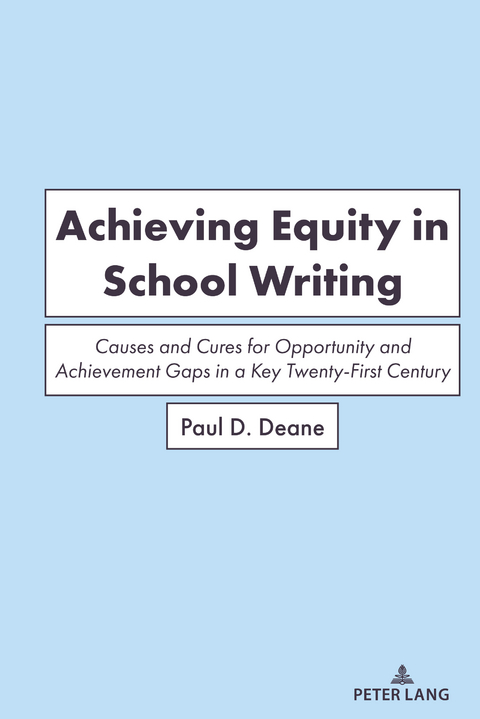
Achieving Equity in School Writing
Peter Lang Publishing Inc (Verlag)
978-1-4331-9398-9 (ISBN)
lt;p>Writing is a critical skill people need to survive and prosper in the modern economy. But most people fail to become competent writers. Those who succeed (at least, in English-speaking countries) are predominantly White, upper middle class, and female. These achievement gaps are primarily the result of opportunity gaps - in other words, they represent the failure of our educational systems to provide equitable instruction. This book examines why so many students fall behind and analyzes what teachers and schools can do to help them succeed. It is for anyone who wants to know, in detail, what modern educational research tells us about the causes and cures for writing achievement gaps, and presents a theory of action designed to help educators and policymakers understand what needs to happen if all students are to become competent writers. Educational statistics demonstrate an ongoing tragedy, in which boys, students from poor families, and members of minority groups are often discouraged, provided substandard education, and then treated as failures. However, there is no magic bullet. Equitable writing instruction happens when schools motivate all students to excel, provide them the knowledge they need to succeed, give them time and space to think and to write, teach them effective strategies to manage their work, and make sure that they master foundational reading and writing skills.
Paul D. Deane (Ph.D., Linguistics, University of Chicago) is a Principal Research Scientist at Educational Testing Service in Princeton, NJ. He has published extensively in linguistics, computational linguistics, and educational measurement and twice received the NCME Bradley Hanson award for his contributions to educational measurement.
Acknowledgments – Lists of Figures – Lists of Tables – Introduction – Why Writing is Hard – Writing as Purposeful Action: Motivation for Writing as Cause and Effect – Writing as Self- Regulation: The Mediating Roles of Reading Fluency and Working Memory – Writing as the Formulation of Ideas: The Mediating Effects of Prior Content Knowledge – Writing as Verbal Self- Expression: The Causal Role of Oral Language Skills – Writing as Getting Words on the Page: The Effects of Transcription Skills on Writing Development – How to Achieve Equity in School Writing – Conclusion – Index.
| Erscheinungsdatum | 31.05.2023 |
|---|---|
| Zusatzinfo | 9 Illustrations |
| Verlagsort | New York |
| Sprache | englisch |
| Maße | 150 x 225 mm |
| Gewicht | 274 g |
| Themenwelt | Geschichte ► Allgemeine Geschichte ► Vor- und Frühgeschichte |
| Geisteswissenschaften ► Geschichte ► Geschichtstheorie / Historik | |
| Geisteswissenschaften ► Sprach- / Literaturwissenschaft ► Anglistik / Amerikanistik | |
| Geisteswissenschaften ► Sprach- / Literaturwissenschaft ► Literaturwissenschaft | |
| Schlagworte | achievement • Achievement Gaps • achieving • Achieving Equity in School Writing • Assessment • Century • cures • DEANE • Equity • Ethnicity • Gaps • Gender • Mason • Opportunity • Paul • Paul D. Deane • Pedagogy • Race • school • SES • Skill • Socioeconomic Status • Tony • Twenty • Writing |
| ISBN-10 | 1-4331-9398-1 / 1433193981 |
| ISBN-13 | 978-1-4331-9398-9 / 9781433193989 |
| Zustand | Neuware |
| Informationen gemäß Produktsicherheitsverordnung (GPSR) | |
| Haben Sie eine Frage zum Produkt? |
aus dem Bereich


